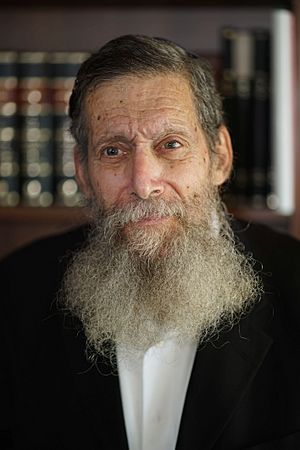Yehuda Henkin facts for kids
Quick facts for kids Yehuda Herzl Henkin |
|
|---|---|
 |
|
| Religion | Judaism |
| Denomination | Orthodox Judaism |
| Personal | |
| Nationality | Israeli |
| Born | 1945 |
| Died | 23 December 2020 (aged 74–75) Jerusalem, Israel |
| Senior posting | |
| Title | Rabbi |
| Yahrtzeit | 9 Tevet 5781 |
Rabbi Yehuda Herzl Henkin (born in 1945, passed away on December 23, 2020) was a very important rabbi and expert in Jewish law. He was known as a posek, which means he made decisions on Jewish law questions. He also wrote a famous series of books called Benei Vanim.
Contents
Early Life and Learning
Yehuda Henkin was born in Pennsylvania in 1945 and grew up in New Haven, Connecticut. His father, Dr. Avraham Hillel Henkin, led the local Jewish education board.
After finishing high school in 1962, he spent five years studying with his grandfather, Rabbi Yosef Eliyahu Henkin. From his grandfather, he received semichah, which is like a special certificate that allows someone to be a rabbi. He also got semichah from another rabbi, Yehuda Gershuni. During this time, he also earned a master's degree in the study of religion and society from Columbia University.
In 1972, Rabbi Henkin and his wife, Chana, moved to Israel. He first served as a rabbi in the Beit She'an valley area before moving to the city of Jerusalem.
Family Life
Rabbi Henkin lived in Jerusalem with his wife, Chana Henkin. Chana is well-known for starting and leading Nishmat, a special school in Israel where women can study advanced Jewish texts.
Sadly, in 2015, their son, Rabbi Eitam Henkin, and his wife Naama were killed by terrorists. This happened in front of their four young children.
One of Rabbi Henkin's closest students was Rabbi David Sperling. Rabbi Sperling studied with him for more than 30 years and now leads the study hall at Nishmat.
Books on Jewish Law
Rabbi Henkin wrote several important books that explain Jewish Law. Between 1981 and 2004, he published four volumes of his book series called Benei Banim. This name means "Sons of Sons" in Hebrew.
In 2019, he also published a book about understanding the Bible called Mahalakhim Ba-Mikra.
Responsa: Answering Questions on Jewish Law
As a posek, Rabbi Henkin wrote many responsa. These are written answers to questions about Jewish law. Here are some examples of topics he discussed:
- He wrote about whether people who believe that the Lubavitcher Rebbe (a famous Jewish leader) is the messiah are considered to have wrong beliefs. He decided that they are not.
- He agreed with his grandfather that hearing the Shofar (a ram's horn blown on Jewish holidays) or the Megillah (the story of Purim) cannot be done by listening to the radio. He also said that the rule of Kol Isha (which means a man should not listen to a woman singing) does not apply to a woman's voice heard on the radio. He was not sure if this applied to hearing a woman's voice on television.
- He allowed women to study the Talmud, which is a very important book of Jewish law and discussions.
- He permitted dancing on the Sabbath, but he said that clapping hands was not allowed.
- He also said it was okay for a man to shake a woman's hand if she offered it, and vice versa.
Different Views on Jewish Law Books
Rabbi Henkin's grandfather, Rabbi Yosef Eliyahu Henkin, thought that a book called the Aruch HaShulchan was more important than another book called the Mishnah Berurah. These are both very important books that explain Jewish law.
Here are some reasons why the Aruch HaShulchan was seen as very important:
- It was published later than most of the Mishnah Berurah, which means it could include more recent discussions.
- It covers all parts of the Shulchan Aruch, which is the main code of Jewish law.
- Most importantly, the Aruch HaShulchan often describes the actual customs (minhagim) that Jewish communities followed at the time. The Mishnah Berurah focused more on the exact text of the law.
Discussion on Partnership Minyan
Rabbi Henkin also wrote about a topic called "partnership minyan." A minyan is a group of ten Jewish adults needed for certain prayers. In a "partnership minyan," women take on more roles in leading prayers and reading from the Torah.
Rabbi Henkin wrote about why he believed calling women to read from the Torah in this way was not in line with traditional Jewish law. He explained his reasons based on halakha (Jewish law). He felt that such changes went against the long-standing customs and practices of Orthodox Judaism.

